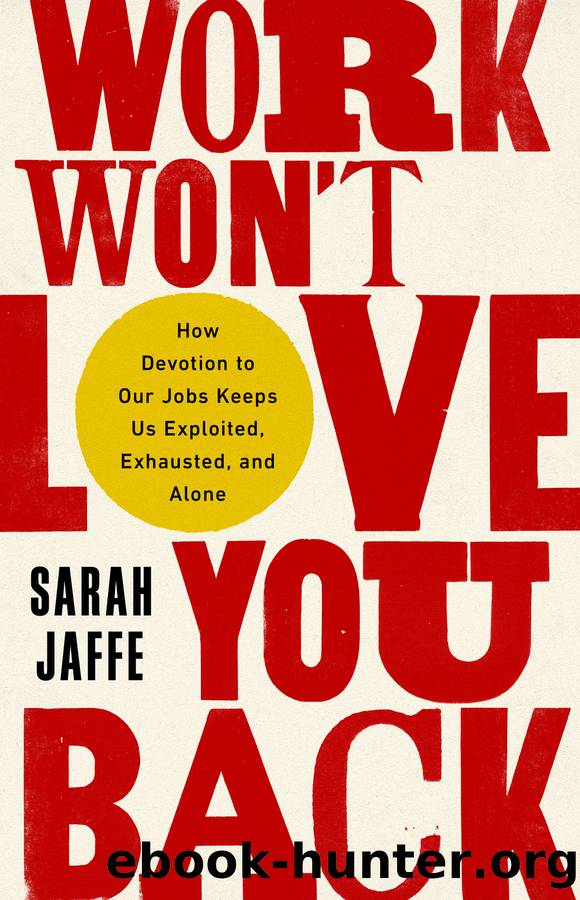Work Won't Love You Back by Sarah Jaffe

Author:Sarah Jaffe [JAFFE, SARAH]
Language: eng
Format: epub
Publisher: PublicAffairs
Published: 2021-01-26T00:00:00+00:00
SWATHED IN COATS, SCARVES, HATS, AND HOODS AGAINST THE QUEBEC cold in the winter of 2019, tens of thousands of interns took to the streets bearing signs in French and English, decrying unpaid internships. âItâs not complicated, all labour deserves a fair wage,â âLâexploitation nâest pas une vocationâ (Exploitation is not a vocation), and âNe soyons pas invisibles, femmes devant!â (No longer invisible, women rise!) were just a few of the signs they bore. One demonstration, titled âJ-F better have my money,â for Jean-François Roberge, the minister of education and higher education in Quebec, saw the interns surging down the streets of Montreal; in the smaller city of Gatineau, they marched behind a sign that read, âPas de salaire, pas de stagiaireâ (No salary, no interns). Interns struck as well in Rimouski, Sherbrooke, Saint-Jérôme, and Quebec City.
Camille Marcoux and Chloe Cabral were among the crowds in Montreal, on strike against the internships that were required for their degrees. Their demands were simple: they wanted a wage, and they wanted to be recognized under labor law like any other worker.
The strikes were organized by the Comités unitaires sur le travail étudiant (Student Work Unitary Committees), known by their acronym CUTEs. A network of autonomous student organizations, they aimed to counteract some of the top-down structures of the 2012 student strikes, and therefore applied an explicitly feminist lens to their organizing as well as to their analysis of internships. Inspired by the Wages for Housework movement, they began organizing in 2016 around the idea that school work, too, was a form of reproductive labor. Unpaid internships, then, were a natural target, particularly since they were most common in fields where women predominated. The CUTEs were given a boost by the victory of psychology interns in Quebec in 2016, who won a financial compensation package for their doctorate-level internships, though it came in a lump sum rather than a wage.38
The interns struck first in November 2017; thousands more struck in February 2018, and again for International Womenâs Day, as Womenâs Strikers organized around the world. Fifty-five thousand interns went on strike in the fall of 2018, and in the spring of 2019, more than thirty-five thousand. The interns in one action gathered to read aloud the letters or emails theyâd received from supervisors encouraging them to cross the picket line and report for their unpaid jobs, dramatizing the expectations they faced on the job. And in 2019, they added a new tactic: staging roving picket lines at internship locations, creating an âinternship tourâ to make sure the companies knew of the internsâ demands. Previously, student strikes had mostly been located at the universities and CEGEPs, where strikers would go from class to class calling their colleagues out to join the action. But the picket lines were âa good way for us to engage with the colleagues in front of the schools,â Marcoux explained, âso the intern didnât have all the responsibility to explain to all of the colleagues in the school why she was on strike and what the impacts were.
Download
This site does not store any files on its server. We only index and link to content provided by other sites. Please contact the content providers to delete copyright contents if any and email us, we'll remove relevant links or contents immediately.
Bullshit Jobs by David Graeber(3173)
Radical Candor by Kim Scott(2210)
I Am Right, You Are Wrong by Edward De Bono(2106)
23:27 by H. L. Roberts(1889)
Nomadland by Jessica Bruder(1680)
Average Is Over by Tyler Cowen(1539)
High-Impact Interview Questions by Victoria A. Hoevemeyer(1402)
Out of Our Minds: Learning to Be Creative by Ken Robinson(1375)
The Conflict Resolution Phrase Book by Barbara Mitchell & Cornelia Gamlem(1340)
The Ideal Team Player by Patrick M. Lencioni(1313)
The Asshole Survival Guide by Robert I. Sutton(1275)
An Everyone Culture: Becoming a Deliberately Developmental Organization by Robert Kegan & Lisa Laskow Lahey(1275)
Automatic Society by Bernard Stiegler(1217)
Unleashed by Anne Morriss & Frances Frei(1216)
Who by Street Randy & Smart Geoff(1194)
42 Rules of Employee Engagement by Susan Stamm(1187)
Who Moved My Cheese?: An Amazing Way to Deal With Change in Your Work and in Your Life by Johnson Spencer(1175)
96 Great Interview Questions to Ask Before You Hire by Paul Falcone(1129)
The Power of Disability by Al Etmanski(1079)
